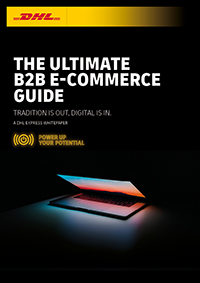Grow your business with the Discover newsletter
Logistics advice & insights straight to your inbox
Subscribe now
With the pandemic still impacting businesses and society at large, the need for B2B e-commerce platforms to become more robust is growing stronger. From manufacturing to healthcare and even food & beverages, each industry needs to ensure smooth supply and delivery of raw materials to meet increasing consumer demands in the most efficient and safe manner, which can be achieved on the digital marketplace. This means, B2B retailers now have to provide a user-friendly as well as an advanced B2C-style buying experience.
Although the B2B e-commerce sector has seen staggering growth over the years, a research done by Gartner shows that almost 80% of the B2B transactions will happen over a digital interface by 2025, as cited in the whitepaper “Tradition Is Out. Digital Is In” by DHL Express. The whitepaper also tells us that while the fashion sector will quickly adapt to these functional changes, others, such as the pharmaceutical sector will still require a long-term development plan.
What began as a solution to meet the crisis has now become an expected norm of business functioning. With new technologies coming into play, such as big data analytics, AI, pricing algorithms, streamlined data - all these factors are helping to reduce costs as well as facilitate operational efficiencies.
However, despite these advancements, there are a few key areas that the B2B e-commerce sector must focus on to thrive in the competitive marketplace. DHL’s whitepaper highlights what those common challenges are and what can be done to bridge the gap.
For a successful B2B e-commerce digital transformation, employees will be required to upskill themselves in order to understand and successfully manage new business expectations and supply chain functioning. They will need to adopt a ‘digital first’ mindset in order to understand the technologies better to implement them effectively and problem-solve challenges in real-time. This will boost their productivity, making them more involved and committed to the process.
B2B purchases are usually large in volume and require a customised solution for each business need. This basically means that suppliers have to work out competitive pricing models to maintain their bottom line and also earn profit. Most B2B customers expect economic bulk pricing deals. But, if B2B buyers have to move this entire process to an online portal, they will need to consider alternate ways to incentivise buyers. One way to do this is to implement a ‘buy more, pay less’ pricing strategy or offer discounts on bulk purchases.
Digital marketplaces that deal with cross-border trade have experienced enormous economic growth. To do that, B2B businesses, for instance, will have to be proficient in cross-border customs rules, exchange rates, duties and taxes to build a strong digital infrastructure. Not only that, they will require an agile transport network to meet the new logistics demands of their buyers.
At present, staying competitive and ahead of others remains a big challenge for many B2B companies. Since with every yin comes yang, this means even if your B2B platform is well-established, you may find it difficult to compete with agile, start-up companies. It’s because even a nascent start-up can introduce a dynamic marketing strategy through webinars, free online social events, and ads on social media. These help them to stay on top of mind for their potential and existing customers.
The whitepaper also stresses that if B2B e-commerce has to overcome these challenges and open up their markets, they will have to invest in cross-border shipping. This will require them to streamline their purchasing processes, work culture, and technologies.
Here are some practical recommendations you can follow to make your B2B e-commerce journey as smooth as possible.
Make the decision today to start a seamless e-commerce journey. Willing to know more about the transformation of B2B e-commerce?
Your B2B e-commerce revolution starts here. Download the White Paper to begin your journey towards meeting the new customer demands and help your business grow into a more profitable operation.

